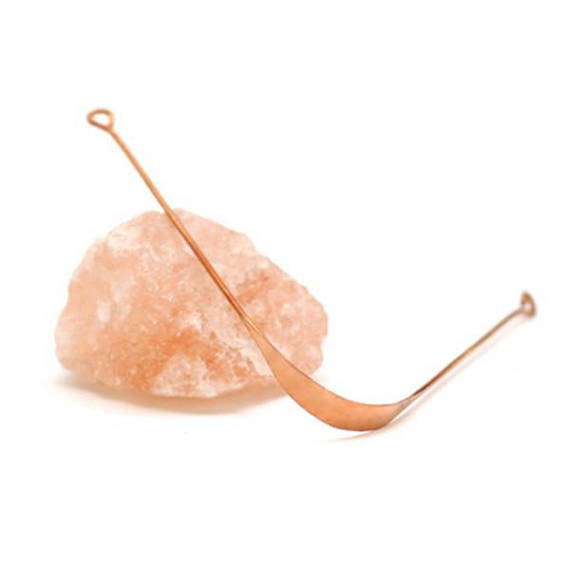
by Lucinda Staniland
If you try to sell me something, I will always approach it with a healthy dose of skepticism.
And for good reason. In our consumerist world, I am constantly bombarded with “life-changing” devices and programs, many of which fall more than a little short of their magnificent marketing claims.
In my experience, it ALWAYS pays to ask: What is the history of use behind this product? Who is making and marketing it and what motivates them? Are their claims evidence-based? And, if I choose to engage with a product or service, what is my personal experience of it and does it actually work for me?
So when Valka Yoga asked me to review their copper tongue scraper, you can be sure that I had a LOT of questions.
What IS this thing? Does it really work? Is there any historical and scientific evidence to back that up?
Valka Yoga make some big claims about their product:
“Using a tongue scraper to clean the tongue first thing every morning is the most effective way to remove the bacteria that collects on top of the tongue each night causing bad breath.
Copper has powerful anti-bacterial properties.
Tongue scraping also has some subtle healing actions that relate to the vital organs and digestive tract”
So I set off to investigate the history and science of copper tongue scrapers, as well as testing it out on myself.
What I discovered surprised me.
First off, is copper actually anti-bacterial?
I quickly discovered that the anti-microbial properties of copper have, in fact, been extensively studied. Copper has repeatedly been proven to kill many kinds of bacteria, including really nasty ones such as E.coli, MRSA, Norovirus, and Influenza on contact, although the exact mechanisms of how it does this are not yet fully understood.
As a result, copper is now being used in hospitals, gyms, airports, theme parks, train stations, and gyms all over the world to reduce infection rates. In hospitals, a recent study found that infection rates were reduced by 58% for patients in rooms fitted with components made of copper instead of standard materials such as stainless steel.
Humans have had a long relationship with copper. It is considered to have been the first metal to become part of human history and historical evidence indicates that it has been used by humans for more than 10,000 years. Many ancient cultures particularly appreciated the medicinal and microbe killing properties of copper, including the Egyptians, the Romans, the Greeks, the Aztecs and the Ayurvedic tradition of India.
Conclusion? There is a significant scientific and historical precedent for the use of copper to kill bacteria and other microbes.
And does tongue cleaning really result in better oral and whole-body health?
The scientific evidence for tongue cleaning is not quite as clear cut, but it’s also not an area that has received a lot of attention. Currently, the evidence that tongue cleaning is beneficial is what researchers like to describe as “tentative”. Basically, more data is needed.
In terms of oral health, the consensus seems to be that tongue cleaning reduces bacterial load on the tongue and results in short-term improvements to bad breath. Whether or not it reduces the incidence of dental plaque is unclear, and results have varied between studies.
There is preliminary evidence to suggest that tongue cleaning may have other, more systemic effects on the whole body. A 2019 study found that daily tongue cleaning may improve cardiovascular health and ‘help fight the aging process”, as it favors an increase in ‘good’ bacteria that generate nitric oxide, a molecule that helps to maintain healthy blood pressure, prevent cardiovascular disease and may be important in regulating the aging process.
More general research on oral health has found that the health of the mouth is connected to the health of the entire body. Recent research suggests that poor oral health is associated with an increased risk of developing Alzheimer’s disease, heart disease, and autoimmune disease.
Historically, tongue cleaning has been practiced for centuries by a diverse range of cultures using a variety of materials including wood, ivory, mother-of-pearl, whalebone, celluloid, tortoiseshell, plastic, and metals such as gold, silver, and copper. In particular, Ayurvedic medicine, one of the oldest ancient traditional systems of medicine in the world, has long promoted the benefits of daily tongue scraping using a cooper tool.
In the Charaka Samhita, an ancient Ayurvedic text, it says that cleaning the tongue,
“Removes foul smell, tastelessness … and by taking out dirt coated on the tongue, teeth and mouth brings relish immediately.”
Ayurveda also proposes that tongue scraping stimulates the vital organs and digestive tract and increases the sensitivity of your tastebuds, thus enhancing your ability to make healthy food choices.
So… should I be using a copper tongue scraper?
Overall, I was pleasantly surprised at the amount of evidence backing up the use of a copper tongue scraper.
Is copper antimicrobial? Why yes, it most definitely is! And although I didn’t find any research specifically on copper tongue scrapers, it certainly seems to be a superior material for something designed to remove nasty bacteria from the surface of the tongue. Unlike other materials stainless steel, bamboo, or plastic it can actually kill those bad guys just by touching them!
Does tongue cleaning promote better oral health and whole-body health? Probably yes, according to the current research, but to what extent we don’t yet know for sure. Although I imagine that devoted tongue cleaners, across many time periods and cultures, would give you a much more enthusiastic answer.
All that was left now was to conduct my own experiment with Valka Yoga’s copper tongue scraper.
I’m a bit of an oral health nerd (cool, I know!) and once I had an understanding of the science and history behind tongue cleaning and copper, I was excited to try it out.
The result? After a week of daily tongue cleaning I did notice a difference: My mouth felt fresher and cleaner, my gums seemed to be slightly less inflamed, and my sense of taste was sharper and clearer.
Using the tongue scraper was quick, painless and straightforward. It only took me about 45 seconds to run the tongue scraper over my tongue a few times, rinsing it in between. It was certainly less tedious than flossing (which, by the way, also has only ‘tentative’ evidence proving that it is effective)
While conducting my tongue scraping experiment, I continued with my usual regime of twice-daily brushing and daily flossing. Based on the research I’ve done, I wouldn’t recommend using tongue scraping to replace brushing and flossing. But, so far, it seems to be a beneficial (and easy!) addition to my oral health care.
Yes, I could wait for a Double-Blind Placebo-Controlled Clinical Trial to come out that proves beyond doubt the benefits of copper tongue scraping before adopting it myself, but I don’t feel the need to do that.
My skeptical side feels good about the current evidence that supports the practice of copper tongue scraping, and I’m sure there will be more research to come in the future.
Overall, incorporating a copper tongue scraper into my daily routine seems like a no-brainer. There are very minimal downsides: It is low risk, low-cost and quick and easy to use. And the possible upsides are massive! Who doesn’t want stellar oral and whole-body health?
About Lucinda

Lucinda has worked at The Yoga Lunchbox since 2012 and has been the Editor since 2017. She loves the opportunity to be constantly immersed in the world of yoga, and particularly in the vibrant NZ yoga community. Lucinda is also a constantly curious learner and researcher, particularly in the areas of movement, health, and embodiment.
She loves to hear from Yoga Lunchbox readers, so get in touch with her via email with your questions, ideas, and stories.
Leave a Reply